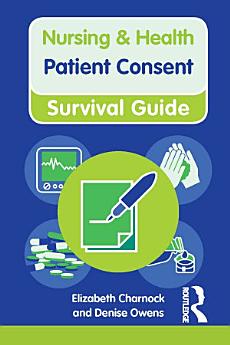Patient Consent
Set 2017 · Routledge
E-book
42
Mga Page
family_home
Kwalipikado
info
reportHindi na-verify ang mga rating at review Matuto Pa
Tungkol sa ebook na ito
Ideal for quick reference, this pocket-sized (120x80mm), spiral-bound book in the popular Nursing & Health Survival Guide series puts all the crucial information about patient consent at your fingertips.
There is an obligation for practitioners to obtain valid consent from their patients before examination, routine personal care or therapeutic treatment. However, the law relating to consent is complex. Situations may arise where a patient requires urgent treatment, yet is either unwilling or unable to give their consent, or there are concerns over the form and context of the consent.
All you need to know on:
- the underlying principles of consent;
- consent and the adult patient;
- consent and the adult who lacks capacity;
- children and consent;
- young people and consent.
Tungkol sa may-akda
Elizabeth Charnock is a Lecturer in Nursing at the School of Nursing, Midwifery & Social Work, University of Salford, UK.
Denise Owens is a Lecturer in Nursing at the School of Nursing, Midwifery & Social Work, University of Salford, UK.
I-rate ang e-book na ito
Ipalaam sa amin ang iyong opinyon.
Impormasyon sa pagbabasa
Mga smartphone at tablet
I-install ang Google Play Books app para sa Android at iPad/iPhone. Awtomatiko itong nagsi-sync sa account mo at nagbibigay-daan sa iyong magbasa online o offline nasaan ka man.
Mga laptop at computer
Maaari kang makinig sa mga audiobook na binili sa Google Play gamit ang web browser ng iyong computer.
Mga eReader at iba pang mga device
Para magbasa tungkol sa mga e-ink device gaya ng mga Kobo eReader, kakailanganin mong mag-download ng file at ilipat ito sa iyong device. Sundin ang mga detalyadong tagubilin sa Help Center para mailipat ang mga file sa mga sinusuportahang eReader.





